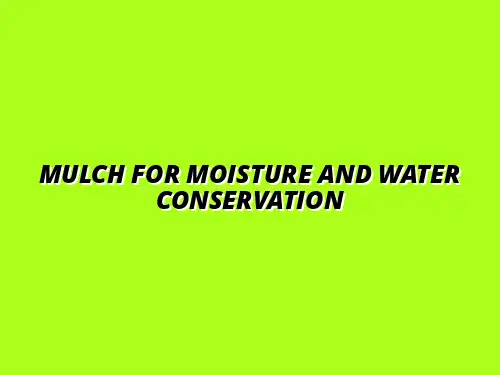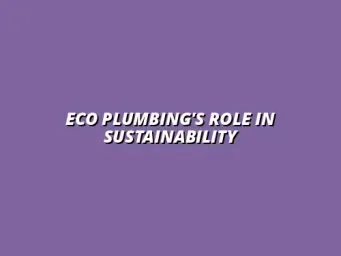Understanding the Importance of Mulch for Moisture Retention
Mulch plays a vital role in maintaining soil moisture, which is crucial for the health of our plants. It acts as a protective layer over the soil, helping to retain water and keep the ground cool. By understanding the importance and types of mulch, we can enhance our gardening practices while conserving water. For more tips on conserving water in your home, check out these water-saving tips.
Incorporating mulch into our gardens not only aids in moisture retention but also provides other benefits like weed suppression and soil enrichment. When we choose the right type of mulch, we create a more sustainable environment for our plants. Let’s dive deeper into what mulch is and the various types available!
Defining Mulch and Its Various Types
Mulch can be defined as any material that is spread or laid over the surface of the soil. It can be organic or inorganic, each serving different purposes in a garden. Understanding these types helps us make informed choices for our gardening needs.
Here are some common types of mulch:
- Organic Mulch: Made from natural materials, it decomposes and enriches the soil.
- Inorganic Mulch: Composed of synthetic materials or stones, it does not decompose.
Organic vs. Inorganic Mulch: Key Differences
The primary distinction between organic and inorganic mulch lies in their composition and benefits. Organic mulch, such as wood chips or leaves, breaks down over time, adding nutrients to the soil. In contrast, inorganic options, like rubber or gravel, do not contribute nutrients but are often longer-lasting.
Consider the following differences:
- Nutrient Contribution: Organic mulches enrich soil, while inorganic do not.
- Longevity: Inorganic mulches last longer compared to organic options.
- Environmental Impact: Organic mulches are more eco-friendly as they decompose and improve soil health.
Popular Organic Mulch Options: Bark, Straw, and Compost
When it comes to organic mulch, there are several popular choices, each with unique benefits. Bark mulch is great for moisture retention and weed prevention, while straw is excellent for vegetable gardens, providing insulation without suffocating plants. Compost, on the other hand, enriches the soil as it breaks down. Efficient watering systems are also crucial for water conservation; learn more about water-efficient irrigation.
Here’s a list of popular organic mulch options:
- Bark Mulch: Effective at retaining moisture and suppressing weeds.
- Straw: Lightweight and perfect for vegetable gardens.
- Compost: Offers rich nutrients as it decomposes.
Inorganic Mulch Choices: Rubber, Gravel, and Landscape Fabric
Inorganic mulches, while not as beneficial for soil health, have their own advantages. Rubber mulch is durable and great for playgrounds, while gravel provides excellent drainage around plants. Landscape fabric is often used as a barrier to prevent weeds while allowing water and nutrients to reach the soil. Proper maintenance of outdoor plumbing systems is also important for avoiding water waste.
Here are some common inorganic mulch options:
- Rubber Mulch: Long-lasting and ideal for heavy traffic areas.
- Gravel: Provides good drainage and prevents soil erosion.
- Landscape Fabric: Blocks weeds while letting moisture through.
The Role of Mulch in Water Conservation
Mulch is essential for conserving water in gardens and landscapes. By covering the soil, mulch helps to significantly reduce evaporation rates. This means that the moisture present in the soil stays longer, supporting plant growth and reducing the need for additional watering. Collecting rainwater can further enhance your water conservation efforts; explore rainwater harvesting techniques.
Moreover, mulch plays a significant role in maintaining a consistent moisture level in the soil. This is especially important during hot weather when plants can suffer from drought stress. Let's explore how mulch specifically aids in water conservation!
How Mulch Reduces Evaporation Rates
One of the key benefits of applying mulch is its ability to block sunlight from directly hitting the soil. By doing this, it helps to lower the soil temperature, which in turn reduces water evaporation. This is particularly helpful in sunny gardens where the sun can dry out the soil quickly.
Here’s how mulch helps reduce evaporation:
- Shade Creation: Blocks sunlight from reaching the soil.
- Temperature Control: Keeps the soil cooler.
- Moisture Maintenance: Retains moisture longer in the soil.
Impact of Mulch on Soil Temperature and Moisture Levels
Mulch not only conserves moisture but also helps to regulate soil temperature. During the hot months, it keeps the soil cooler, which benefits plant roots. Conversely, in cooler months, mulch acts as insulation to keep the soil warmer. Remember that efficient water heater maintenance is also a key part of water conservation; check out this water heater maintenance checklist.
The combined effect of mulch on soil temperature and moisture levels is profound:
- Stable Conditions: Creates a balanced environment for plant roots.
- Reduced Stress: Minimizes stress on plants, leading to healthier growth.
- Improved Growth Rates: Supports overall plant health and productivity.
Addressing Common Questions About Using Mulch for Water Conservation
It's common to have questions when starting with mulch in your garden! Understanding the frequency of mulch application and potential pest issues can help you maintain a healthy garden while conserving moisture. Here, I’ll answer some of the most frequently asked questions about using mulch effectively. Conserving water in the bathroom is another important aspect of home water conservation; explore these bathroom plumbing tips.
How Often Should Mulch Be Reapplied?
The frequency of mulch reapplication can depend on several factors, including the type of mulch used, the climate, and the specific needs of your plants. Generally, I recommend checking your mulch layer at least twice a year to determine if it needs replenishing.
- For organic mulch, consider replacing it every 6 to 12 months as it breaks down.
- In hot and dry climates, you may need to replenish more often to maintain moisture retention.
- Areas with heavy rain may experience faster decomposition; monitor your mulch closely!
Regularly refreshing your mulch not only improves moisture retention but also enhances the overall aesthetics of your garden. Keep an eye on mulch thickness, ensuring that it remains effective for your plants.
Can Mulch Attract Pests and How to Prevent It?
Mulch can indeed attract certain pests, but with the right strategies, you can prevent them! Some pests may find refuge in the moisture-rich environment created by mulch, so being proactive is essential.
- Choose pest-resistant organic mulches like cedar or cypress.
- Avoid piling mulch against the stems of plants, which can invite pests.
- Keep mulch layers even and well-aerated to discourage pests from settling in.
Regular maintenance and monitoring can go a long way in keeping your garden healthy and pest-free. If you notice any signs of pests, addressing them quickly will help protect your plants!
Recognizing the Additional Benefits of Mulch Beyond Moisture Retention
While conserving water is a significant advantage of using mulch, there are many other benefits that come along with it! From promoting soil health to enhancing the look of your garden, mulch provides a well-rounded set of advantages.
Contributions of Mulch to Soil Health and Plant Growth
Using mulch can significantly improve soil health and encourage robust plant growth. It acts as a protective layer that supports various beneficial processes.
- Organic mulches decompose over time, adding nutrients back into the soil.
- They help enhance soil structure, promoting better aeration and drainage.
- Mulch can suppress weeds, reducing competition for nutrients and water!
This synergy between mulch and soil health creates a thriving environment for your plants. Healthy soil leads to stronger growth and ultimately more vibrant gardens.
Enhancing Aesthetic Appeal in Gardens and Landscapes
Besides its functional benefits, mulch can also enhance the visual appeal of your garden! By choosing different types of mulch, you can create beautiful, distinctive landscapes. For further information on home plumbing maintenance, you can check out our resources at PlumbProCare.
- Colored mulch can add a vibrant touch and complement your plants.
- Using natural mulch like wood chips or straw can give your garden a rustic charm.
- Mulch can help define garden beds and pathways, creating a more organized look.
Ultimately, the right mulch can turn a standard garden into a stunning outdoor space! It’s a simple yet effective way to elevate your gardening aesthetic.
Integrating Mulch into Your Sustainable Gardening Practices
Incorporating mulch into your gardening routine can also align well with sustainable practices! It supports eco-friendly gardening by promoting conservation and reducing waste.
Combining Mulching with Other Water Conservation Techniques
To make the most of your gardening efforts, consider combining mulch with other water conservation techniques. This multi-faceted approach will maximize moisture retention and support healthy growth.
- Use drip irrigation systems in tandem with mulch for efficient watering.
- Practice crop rotation and companion planting alongside mulching.
- Incorporate rain barrels to collect water for your mulched areas.
By integrating these methods, you not only improve moisture retention but also create a more sustainable garden environment!
Creating a Comprehensive Garden Care Routine for Optimal Results
A well-rounded garden care routine will help you maximize the benefits of mulching. Ensuring consistent maintenance and care helps your plants thrive!
- Regularly monitor moisture levels in the soil beneath the mulch.
- Schedule seasonal checks for pests and diseases.
- Plan your mulching schedule around seasonal changes for best results!
Following these steps will create a healthy ecosystem for your plants, ensuring they receive all the benefits of mulch while maintaining optimal conditions.
Final Thoughts on Maximizing Water Conservation with Mulch
Using mulch effectively is a key strategy in promoting water conservation in your garden. I encourage everyone to embrace this wonderful practice as it provides numerous benefits!
Encouraging Sustainable Practices in Home Gardening
By understanding and implementing mulching techniques, you can foster a sustainable gardening environment. This practice not only conserves water but also supports the overall health of your garden!
- Commit to using organic materials whenever possible.
- Educate others about the benefits of mulching in community gardens.
- Experiment with different types of mulch to find what works best for you!
Every little effort counts in making a positive impact on the environment, and starting with your garden is a great way to do it!
Call to Action: Start Implementing Mulching Strategies Today
If you haven’t already, now is the perfect time to start using mulch in your garden! Begin by selecting the right type of mulch for your plants and applying it correctly to enjoy all the benefits it offers.
- Assess your garden needs and choose appropriate mulch.
- Set a schedule for regular maintenance and reapplication.
- Share your experiences and successes with friends and fellow gardeners!
Let’s work together to create beautiful, sustainable gardens that conserve water and promote plant health!










